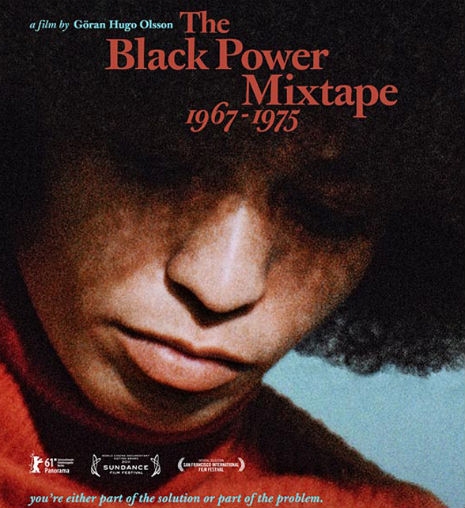
The Black Power Mixtape 1967-1975 directed by Göran Hugo Olsson is a timely documentary on the birth of the Black Power Movement that combines recently discovered film footage and interviews from the the 1960s and early 70s with commentary from contemporary Black activists and musicians.
Shot in stunning 16mm black and white and color by a Swedish film crew at the height of civil unrest over Vietnam and racial inequality in America, BPM features compelling interviews with Stokely Carmichael, Eldridge Cleaver, Angela Davis, Huey Newton and other key activists of the period, interspersed with powerful scenes of ghetto life in Oakland and Harlem. Both poetic and potent, the film manages to stir the heart without resorting to hyperbole or cheap sentiment. The subject matter is powerful enough on its own. The images and words speak for themselves…and they speak eloquently.
The only sour moment in the film is when a reptilian Louis Farrakhan spews the Nation Of Islam company line, silver tongue wrapping itself around every vowel like a dung beetle rolling in it’s own excrement and eyes leering with the lascivious gleam of an encyclopedia salesman looking to slip his sweaty hands under the apron of an unsuspecting suburban housewife And Malcolm died for this fucker’s sins.
As scenes unfold on the screen, personal reflections on the era and its influence on their lives and thinking are shared by Talib Kweli, Erykah Badu, ?uestlove, John Forté and Robin Kelley, among others. These were formative decades for a new generation of Black American activists, artists and teachers and the inspiration of the The Black Panthers, Martin Luther King, Malcolm X and Bobby Kennedy endures.
I have my own memories of this pivotal period in American history. I recall one of my first acts of becoming politically engaged. I was 17 and living in Berkeley. It was 1968. I went to The Black Panther headquarters, an aging, two-story, clapboard house in Oakland, and asked them what I could do to help. After getting over their initial amusement of seeing a skinny, long-haired, white boy standing in their office, two Panthers engaged me in conversation, curious to know my motivations. I told them I’d just read Eldridge Cleaver’s “Soul On Ice” and had been inspired by it, enough to do whatever I could to make the world a more just place. They handed me a stack of The Black Panther Newsletter and sent me out the door. I became a paperboy for the revolution.
While I watched BPM, the parallels between the civil rights and anti-war actions of the 1960s with the current Occupy Wall Street movement were quite obvious. We are still fighting the good fight…and it never seems to end. We make small inroads toward justice and then are slapped back down. But there is forward movement. Historically, popular uprisings that become the target of government suppression may falter but they always find a way to re-invent, resurrect and re-engage. We are seeing it play out at this very moment as the OWS survives against all efforts by the government and its police force to extinguish it. The success of the uprisings of the Sixties remind us that people DO have the power. Listening to and watching the speeches of Stokely Carmichael and Martin Luther King (the night before he was assassinated) not only made me feel proud to have been in the crux of it all at the time, it emboldened me to continue the fight and also angered me in knowing that there is still a fight to be fought.
The Black Power Mixtape is currently available for instant viewing on Netflix.
Unjustly imprisoned for being an accessory to the murder of a Judge, Angela Davis discusses violence and revolution in this jail cell interview from BPM. Not long after this interview, Davis was acquitted of all charges against her.